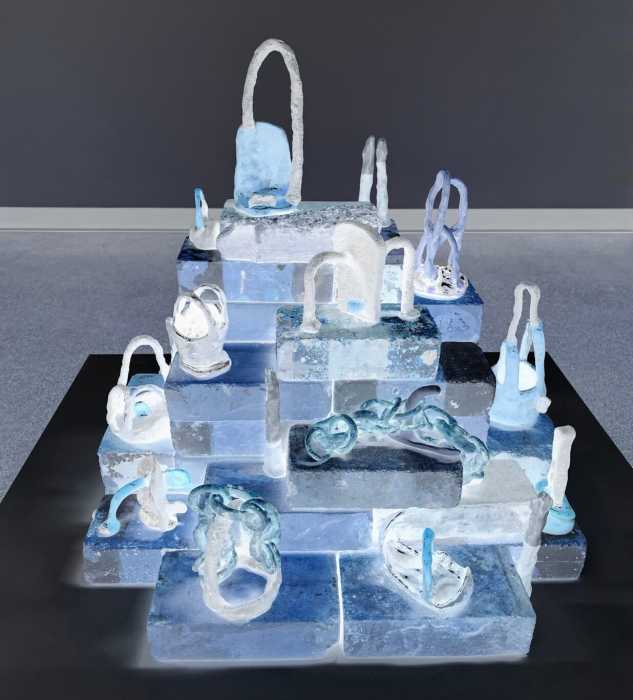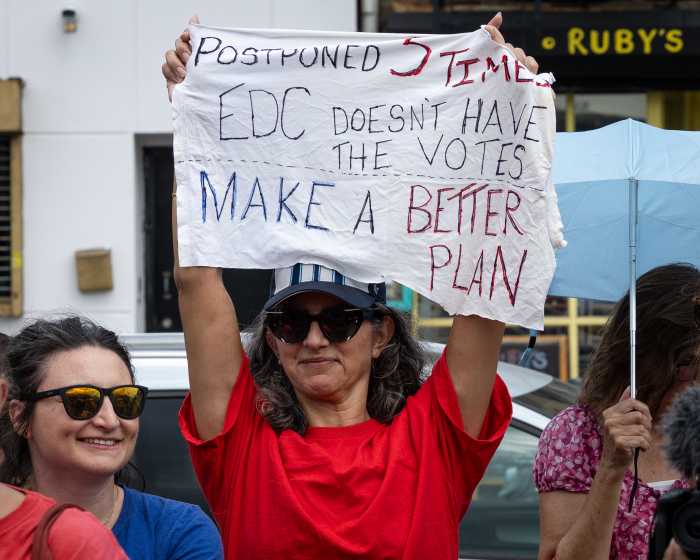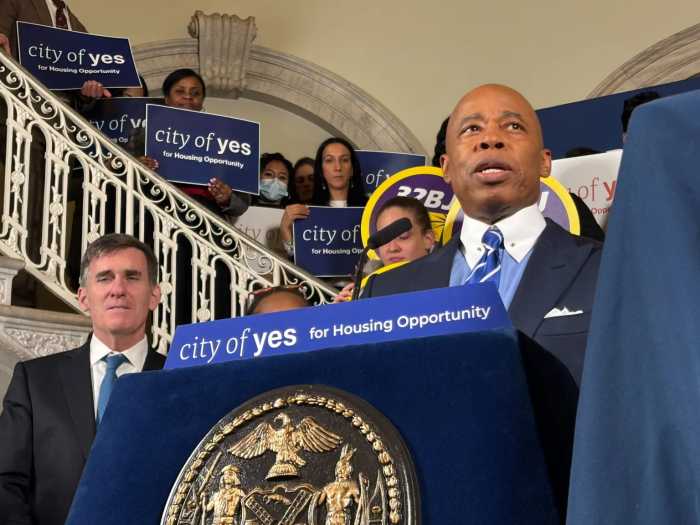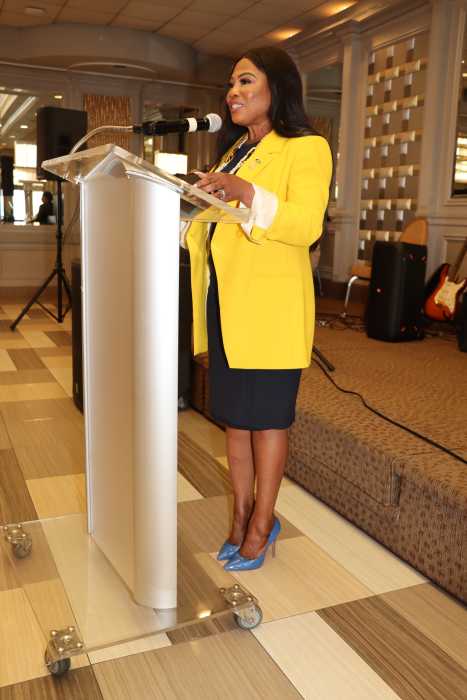BY PAUL SCHINDLER | “I want every New Yorker to hear me when I say: We are ready.”
City Council Speaker Christine C. Quinn uttered these words in a raised voice with clear, slow enunciation, as a bridge from the introduction into the meat of her second State of the City Address.
Delivered on February 12 in the jam-packed City Council Chambers before an audience that included former Mayor Ed Koch, Deputy Mayor Ed Skyler, and Schools Chancellor Joel Klein, Quinn's speech ran to almost 50 minutes. The occasion had all the trappings of a major New York political event – and it was impossible to avoid the thought that it represented a major salvo in a nascent 2009 mayoral bid.
State of the City Speech in Ornate Chambers Begs the Question.
Quinn, a Chelsea Democrat, already made history when she became the first out lesbian or gay leader of the Council in January 2006. A run for term-limited Michael Bloomberg's job next year could make her New York's first woman mayor.
Asked whether she thought Quinn's address signaled her interest in a mayoral bid, city Housing Authority Commissioner Margarita Lopez, who is also lesbian and served with her on the Council from 1999 through 2005, said, “The beginning of her statement that said, 'I'm ready' tells me that that's what it's about. And good for her. And more power to the women's community.”
The subhead in the New York Times story about Quinn's address described it as a “Campaign-Style Talk.”
Fred Hochberg, who is gay and the dean of the Milano New School for Management and Urban Policy, said, “Of course, she's running.” But then reverting to a more cautious tone, he praised Quinn's proposals – on a wide array of issues from schools to housing to tax-free shopping to ferry service- as “good, specific, and targeted,” but declined to say how they would stack up as a mayoral agenda.
“She's still the speaker,” Hochberg exclaimed, smiling.
Emily Giske, a political lobbyist who is lesbian, a vice chair of the state Democratic Party, and considered close to Quinn, was similarly circumspect. Asked if the speaker was in the race, she responded, “Ask her!”
At the speech's conclusion, the sound system erupted with Carly Simon singing “Let the River Run,” the theme from “Working Girl,” a film in which the song accompanied scenes of Melanie Griffith, a pink collar Staten Islander destined for bigger things, aboard the ferry heading toward Lower Manhattan. It was a fitting metaphor for the Long Island-born daughter of a retired union electrician, Lawrence Quinn, who introduced her Tuesday with the endearing yet wisecracking style he has brought to numerous public appearances.
Quinn, of course, offers a unique twist on Working Girl's fate – in addition to thanking her father and her sister Ellen, she also introduced her partner, Kim Catullo, and Catullo's family.
Jimmy Van Bramer, a Democratic state committeeman from Queens who is gay, took note of Quinn's acknowledgement of Catullo and her in-laws.
“Each time she does it, it's a little act of courage I think,” he said. “It's very profound. It's a really beautiful thing. It's something a lot of people take for granted, but we don't.”
The issues Quinn highlighted in her speech reflected the emerging balancing act she has charted in her time as speaker, moving beyond her progressive Lower Manhattan base to embrace a vast, economically and culturally diverse city, in which mayoral elections are often decided by outer borough middle and working class voters.
She nodded to the police department's success in reducing crime, vowed to attack waste in the current system of no-bid school bus contracts, pledged to push for a tax-free shopping week pegged to the IRS rebate distribution, and outlined an ambitious plan for expanding ferry service citywide through the use of public monies.
John Liu, chair of the Council Transportation Committee, lauded Quinn for bringing about “a change of heart” in the Bloomberg administration, which he said had always refused “to acknowledge ferry service as a viable form of mass transit and therefore insisting that it rely totally on private funds.” The speaker announced Bloomberg's support for a pilot program based on public subsidies.
Quinn's support for cuts in the Council budget to match those proposed for city agencies in the Bloomberg budget put Republican Minority Leader James Oddo of Staten Island in the unenviable position of pleading for more spending.
Quinn showed once again that she can play nice with the formerly Republican mayor, standing with him in strong opposition to Democratic Governor Eliot Spitzer's proposal to sell off land parcels adjacent to the Javits Center, a move widely viewed as dooming any prospect for major expansion of the West Side convention facility.
But Quinn emphasized other issues that have long been staples of her political portfolio – pressing once again for a rental tax credit like the one offered homeowners; proposing a “Mitchell-Lama plan for the 21st century” to spur development of housing that is affordable “permanently;” announcing a partnership with the city's Central Labor Council to rescue housing at risk of being deregulated; and using the city's Medicaid database to locate recipients who are eligible for, but not making use of, food stamps.
The speaker's proposal for bonus pay to attract quality middle school teachers will be popular with both middle class parents and the teachers' union, and United Federation of Teachers president Randi Weingarten promptly released a statement lauding the concept.
The mayor's office did not respond to a request for comment on several of Quinn's proposals.
In her only direct reference to agenda items sought by the LGBT community, the speaker noted the Council's appropriation last year of $5 million for rapid HIV testing at public hospitals and clinics and announced a new partnership with Orasure Technologies that she said would make such testing available to tens of thousands of additional New Yorkers.
Quinn made no mention of a running debate, strident at times, she has had with Housing Works and other advocates for HIV-positive homeless people, who are pressing for the expansion of the current housing entitlement offered those living with AIDS to anyone who tests positive. Nor did Quinn discuss recent conversations her office had with African-American AIDS activists who are calling for a declaration of an HIV emergency among black gay men and $5.5 million in funding to expand prevention efforts.
At least once Council member made himself widely available to the press Tuesday to counter the generally positive response Quinn garnered in her speech.
Azi Paybarah's “Politicker” blog on the New York Observer's website posted a video clip of East New York Councilman Charles Barron, with whom the speaker has clashed several times, saying, “I don't know what city she was talking about. There was no mention of working class people or low-income people. It was all middle class, middle class… There was no mention of double-digit unemployment in the black community, in the Latino community. No mention that the police are out of control in our neighborhoods.”
Then Barron, too, turned to the political import of Quinn's speech.
“This is bogus,” he said. “This is a mayoral speech.”
Quinn's office did not respond to a request for comment on her 2009 plan.


































